2015
Events 2015
23-24 November 2015
7th South China Sea International Conference
Paul Sinclair, interim Acting Director of the Centre for Strategic Studies, attended the 7th South China Sea Conference, hosted by the Diplomatic Academy of Vietnam, the Foundation for East Sea Studies and the Vietnam Lawyers Association, which was held in Vung Tau, Vietnam, 23-24 November 2015. Further information about the event is available in Paul Sinclair’s conference report pdf118KB .
17 November 2015
Presentation to Exercise Maru
Paul Sinclair, Acting Director of the Centre for Strategic Studies, gave a presentation to delegates attending Exercise Maru, an International Proliferation Security Initiative exercise organised by the New Zealand Customs Service. Paul’s presentation was on the topic ‘Asia Pacific WMD proliferation trends and issues’. (PDF 85.4KB)
12 November 2015
Russia Today - Some implications for the Asia/Pacific tomorrow
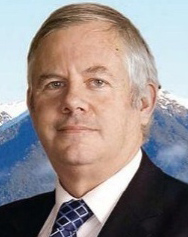
The Centre for Strategic Studies hosted a roundtable with Stuart Prior on 12 November. Stuart has over 30 years of experience in working with the Russian Federation and the former Soviet Union, including serving as New Zealand ambassador in Moscow from 2003 to 2006. He is currently Honorary Consul for Belarus in New Zealand and the New Zealand representative of the Belarusian Chamber of Commerce and Industry. His topic was ‘Russia today- some implications for the Asia/Pacific tomorrow – Thoughts from a New Zealand Perspective’. Stuart commented that the collapse of the USSR continued to have an impact on Russia today. He discussed Russian involvement in the Ukraine and Syria and Moscow’s renewed interest in Asia. He also spoke about the role and influence of the Russian Orthodox Church and Russia’s own battle with Islamic militancy.
4 November 2015
CSS Launches Discussion Paper No 17/15, by Brian Lynch
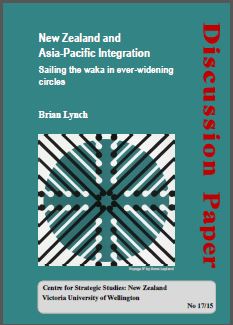
Pro Vice-Chancellor Prof Rob Rabel and the Centre for Strategic Studies hosted an event to launch the publication of CSS Discussion Paper No 17 by Brian Lynch – ‘New Zealand and Asia-Pacific Integration: Sailing the waka in ever-widening circles’ (pdf2214KB .
The event was held in the Hunter Council Chamber at Victoria University of Wellington and included a commentary presented by Emeritus Professor Gary Hawke.
The publication is included in the Centre’s Discussion Paper Series.
20-23 October
CSCAP 44th SCM and 10th General Conference, Mongolia
Paul Sinclair, Regional Security Fellow at the Centre for Strategic Studies, attended the 44th CSCAP Steering Committee Meeting held in Ulaanbaatar, Mongolia, 20-21 October 2015. The meeting reviewed progress made by the CSCAP study groups on energy security, preventive diplomacy, non-proliferation and disarmament, harmonisation of aeronautical and maritime search and rescue, and marine environment protection, and assessed the future direction of each of these groups.
The Steering Committee Meeting was followed by CSCAP’s 10th General Conference, from 21-23 October, which had the overall theme of Confidence Building in the Asia Pacific: the Security Architecture of the 21st Century. The Conference considered challenges and postures in the Asia Pacific; institutional frameworks in the context of regional security architecture in the Asia Pacific; energy and transportation connectivity in the region – trends and opportunities; cooperation in humanitarian assistance and disaster relief in the Asia Pacific; maritime cooperation, and moving from confidence building measures to preventive diplomacy. Paul presented a paper on Maritime Cooperation (PDF 202KB).
13 October 2015
Track II Dialogue: Asia NZ Foundation Prospect Foundation, Taiwan
Paul Sinclair, Regional Security Fellow at the Centre for Strategic Studies, took part in the annual track two dialogue between the Asia New Zealand Foundation and the Prospect Foundation, Taiwan. The event, held in Wellington on 13 October, covered the following topics: Asia-Pacific security challenges and security and stability in the South China Sea, Taiwan’s presidential election and its implications, Asia-Pacific economic integration and China’s behaviour and its challenge to the region. Paul Sinclair presented a paper on the Asia-Pacific Security challenges/South China Sea topic pdf226KB .
7 October 2015
Hutt City Lecture
Centre Director Jim Rolfe lectured on the military use of drones, under the title 'Drones - Friend or Foe', at the annual Hutt City Libraries' tech lecture series. The tech series of lectures aims to bring a comprehensive view of technical matters to public attention by using subject matter experts to cover the range of the issue in a non-technical way.
29 September 2015
Australian Centre for Defence and Security Studies
CSS Director, Jim Rolfe, presented to a group from Australia’s Centre for Defence and Security Studies on its New Zealand study tour. Dr Rolfe’s presentation was on ‘New Zealand’s Regional Security Perspectives: an academic view’.
24 September 2015
NZIIA-Korea Roundtable Discussions at Te Papa
Paul Sinclair, Regional Security Fellow at the Centre for Strategic Studies, participated in a roundtable organised by the NZIIA to discuss the current situation on the Korean Peninsula and initiatives for peace and stability. This event took advantage of a visit to Wellington by a Korean delegation, led by Ambassador Kim Jonghyun, Deputy Director for North Korean Affairs in the Republic of Korea’s Ministry of Foreign Affairs. The Ambassador presented a paper on the current situation on the Peninsula and Paul Sinclair presented a paper on options for re-starting the Six-Party Talks process pdf73KB
18-19 September 2015
10th Anniversary of the September 19 Joint Statement
Paul Sinclair, Regional Security Fellow at the Centre for Strategic Studies, participated in a seminar organised by the China Institute of International Studies in Beijing on 18 and 19 September. The aim of the seminar was to mark the tenth anniversary of the Joint Statement of 19 September 2005, which set out a comprehensive roadmap of agreed outcomes with the aim of achieving the denuclearisation of the Korean Peninsula and ultimately the conclusion of a peace treaty, and to endeavour to identify opportunities to revive the Six-Party Talks process which stalled seven years ago. The seminar was attended by academics from China, Japan, the ROK, the United States, Russia, Australia, New Zealand, Thailand and Cambodia. It was held in the same conference room as the talks that resulted in the 2005 statement. The seminar concluded with an address by China’s Foreign Minister, Wang Yi, who called for an early resumption of the process and implicitly urged the DPRK, which chose not to send representatives to the seminar, to refrain from taking any new action that would heighten tensions on the Korean Peninsula. Paul Sinclair presented a paper on ‘The September 19 Joint Statement and the Lasting Peace and Stability of the Korean Peninsula’ (PDF 74KB).
8 September 2015
Visit by Vietnamese Officials
CSS Director Jim Rolfe lectured a group of visiting officials from Vietnam on the topic of New Zealand’s Defence and Intelligence Relations. The officials are in New Zealand for a two week programme, managed by Victoria University and designed to give them an understanding of New Zealand’s policy environment and policy processes.
4 September 2015
West Philippine Sea/South China Sea Dispute
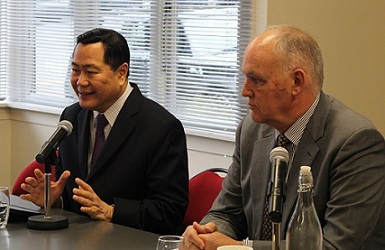
On 4 September the Centre for Strategic Studies hosted a roundtable with Justice Antonio T. Carpio, Senior Associate Justice of the Philippines Supreme Court. Justice Carpio recently presented the Philippines’ case toa UN Arbitral Tribunal in the Hague, seeking a ruling on the legitimacy of China’s claims to a large portion of the South China Sea. The Justice explained the legal case mounted by the Philippines and discussed the security, economic, and environmental consequences of China’s construction activities in the South China Sea.
26 August 2015
Ministry of Foreign Affairs professional development training
The Centre for Stategic Studies led a half-day professional development training programme for new Ministry of Foreign Affairs and Trade officials. The focus of the session was on ‘Geopolitics for Practitioners’.
25 - 26 August 2015
New Zealand India Research Institute Conference: India as a Global Power in the Twenty-First Century
Centre Director, Jim Rolfe and Regional Security Fellow, Paul Sinclair chaired sessions at the NZIRI Third International Conference. Their sessions were on ‘India’s global position: lessons for New Zealand’ and ‘India and the USA’ respectively.
19 August 2015
Kippenberger Chair returns to Thailand
The 2015 Sir Howard Kippenberger Chair in Strategic Studies, Professor Thitinan Pongsudhirak of Chulalongkorn University, Bangkok, completed his tenure at the Centre and returned to Thailand. During his time in New Zealand Thitinan gave public talks and roundtable discussions across the country, primarily to regional NZIIA audiences, but also to university-based groups and other community groups. He led more focused roundtables for government agencies and for the Asia NZ Foundation. He also published a series of articles in Asian media dealing with regional security issues and New Zealand’s role in them. Thitinan’s formal Kippenberger paper, based on his public lecture in Wellington, will be published soon.
Viewpoint on Bangkok bombing
Dr Thitinan Pongsudhirak presents his final opinion piece as the Sir Howard Kippenberger Chair 2015 at the Centre for Strategic Studies. His article 'Terrorist attack in Bangkok turns up heat on Thailand' is published on the Nikkei Asia Review website.
15 August 2015
Presentation to Model UN Security Council Event
Continuing the Centre’s role of explaining the international security environment to as wide an audience as possible, Centre Director Jim Rolfe spoke to a Wellington High Schools Model Security Council meeting on 15 August. The model Security Council is designed to expose participants to the processes and considerations involved in considering issues at the Council. Dr Rolfe spoke to some 60 high school delegates on the subject of global security and the ways that conflict has developed and manifests itself in the world today.
14 August 2015
Diplomatic Roundtable
Visiting Kippenberger Chair in Strategic Studies, Dr Thitinan Pongsudhirak of Chulalongkorn University , Bangkok, led a roundtable focused on ASEAN’s development and possible policy divergences between its mainland and maritime members. The roundtable was attended by members of the diplomatic community as well as scholars from Victoria University.
5 August 2015
Sir Howard Kippenberger Lecture 2015
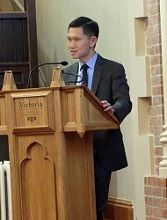
Professor Thitinan Pongsudhirak of Chulalongkorn University, Thailand, the 2015 Kippenberger Chair in Strategic Studies hosted by the Centre, delivered a public lecture as another component of his Kippenberger programme. The topic of the lecture was ‘Global Disorder and Asia-Pacific Consequences: an ASEAN View’. The Kippenberger Chair is funded in memory of Major General Sir Howard Kippenberger, one of New Zealand’s most distinguished soldiers as well as being a strategist and eminent scholar.
Professor Pongsudhirak’s paper will be published separately.
The Kippenberger Lecture is available to view on YouTube
28 July 2015
CSS Publishes new Strategic Background Paper
CSS Senior Fellow, Stuart McMillan's background paper on How Annexation of Crimea Affects Asia pdf393KB , is published under the Centre's Strategic Background Paper series.
25 July 2015
Wellington City 150 years as a capital
The Centre contributed to the University’s open house to celebrate the 150th anniversary of Wellington as New Zealand’s capital. Centre Director, Jim Rolfe, joined Professor Bo Zhiyue of the New Zealand Contemporary China Research Centre to conduct a dialogue in the form of a public roundtable on ‘China-US relations.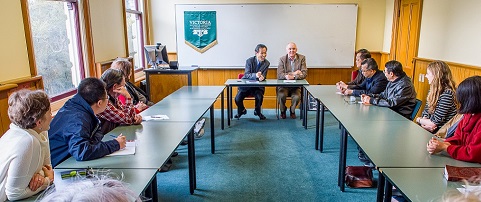
22 July 2015
CSS hosts roundtable with Japanese Defence Vice-Minister
On 22 July the Centre for Strategic Studies hosted a roundtable with Hideshi Tokuchi, Vice Minister for International Affairs in Japan’s Ministry of Defence. This position equates in a New Zealand setting to that of the Secretary of Defence. Prior to taking up his current appointment, Vice Minister Tokuchi has held a number of appointments in Japan’s Defence Ministry and its predecessor the Defence Agency. Vice Minister Tokuchi discussed the recent revision of the guidelines for Japan-United States defence cooperation designed to strengthen the alliance relationship; the Japanese Government’s objectives in preparing legislation that will remove some of the constraints on Japan’s ability to undertake self-defence measures; the key drivers of Japan’s defence policy set out in the most recent Defence White Paper published a few days before the roundtable; Japan’s relations with China, the ROK and the ASEAN countries; the South China Sea and other maritime security issues:Japan’s continued commitment to the rules-based international order; and the importance Japan attaches to cooperation with New Zealand in the security sector. The roundtable was attended by Victoria University staff, senior fellows of the Centre for Strategic Studies, and a representative from the Japanese Embassy.
15 July 2015
Address to the New Zealand Institute of Intelligence Professionals
Centre Director Jim Rolfe gave one of the keynote addresses to the annual conference of the New Zealand Institute of Intelligence Professionals. The conference’s general theme was: ‘Protecting the Balance: Trust, Confidence, Privacy and Intelligence’. Dr Rolfe’s paper was on ‘The Ethics of Intelligence Collection’ pdf152KB .
Official Discussions
Paul Sinclair, Regional Security Fellow at the Centre, met a group of Australian officials at the Australian High Commission to discuss a range of security issues including the current situation on the Korean peninsula, relations with China, and recent developments in the South China Sea.
14 July
New Zealand-China Relations
CSS partnered with the New Zealand Contemporary China Research Centre to prepare a publication, New Zealand’s China Policy: Building a Comprehensive Strategic Partnership, that has now been published jointly by the Australia-China Relations Institute and the NZ Contemporary China Research Centre. The publication was launched in Australia at the Chinese Studies Association of Australia with publicity that emphasised the comprehensive nature of New Zealand’s relationship with China: ‘a diplomatic success story’. CSS Director Jim Rolfe participated with colleagues from the Contemporary China Research Centre in a panel discussion at the launch. A copy of the publication is available for download from the ACRI website.
13 July 2015
Kippenberger Chair 2015 publishes op-ed in Bangkok Post.
Dr Thitinan Pongsudhirak's recent opinion piece in the Bangkok Post looks at issues around Thailand's planned purchase of three attack submarines from China.
7 July 2015
CSS hosts roundtable with Commander of US Pacific Command
On 7 July the Centre for Strategic Studies hosted a roundtable with Admiral Harry B. Harris Jr, Commander of the United States Pacific Command. Admiral Harris, was making his first visit to New Zealand since taking up this appointment just two months ago. His programme included calls on the Prime Minister and the Ministers of Foreign Affairs and Defence. His Command which is headquartered in Hawaii, covers approximately half the earth’s surface. His address and the subsequent discussion period which covered United States-China relations, the Korean Peninsula, the South China Sea and US relations with the ASEAN countries, was attended by a large audience comprising faculty staff from Victoria and Massey Universities, officials from the Ministry of Foreign Affairs, the Ministry of Defence, the New Zealand Defence Force and the Police, senior fellows of the Centre for Strategic Studies and graduate students. Admiral Harris was welcomed to the University by Professor Rob Rabel, Pro Vice Chancellor, International Engagement.
6-10 July 2015
Security Sector Professional Development
CSS in partnership with Victoria’s Centre for Lifelong Learning prepared and presented a one-week course for senior public service security sector personnel. Victoria University has a multi-year contract with the Department of the Prime Minister and Cabinet to prepare public servants at all levels to work effectively within the security sector.
3 July 2015
Roundtable with Prof Patrick Koellner, Director of Asian Studies at GIGA
The Centre for Strategic Studies hosted a roundtable on 3 July with Professor Patrick Koellner, Director of Asian Studies at the German Institute of Global and Area Studies in Hamburg, Germany. Professor Koellner spoke on foreign policy think tanks in China and Japan: their characteristics, current profile and in the case of Japan, their role in building the case for collective self-defence. Professor Koellner compared the rapid growth and emerging profile of Chinese think tanks with those in Japan whose role had been circumscribed by government funding cuts imposed by the Japanese government in 2009. The subsequent discussion explored the question of the roles of think tanks more generally, their sources of funding, and level of independence. The high profile of some Korean think thanks was also discussed.
Observation on the need for a second language in Thailand
Dr Thitinan Pongsudhirak, the 2015 Kippenberger Chair in Stategic Studies, published an opinion piece on the need for a second language in Thailand, largely inspired by the ubiquity of Te Reo Maori in New Zealand.
1-2 July 2015
ASEAN Regional Forum Track 1.5 on Preventive Diplomacy
CSS DirectorJim Rolfe attended the ASEAN Regional Forum track 1.5 Symposium on Preventive Diplomacy in Bangkok on 1 and 2 July. The Symposium brought together officials and scholars from ARF countries to explore issues surrounding preventive diplomacy in an attempt to move towards a more systematic approach to dealing with regional disputes. Dr Rolfe presented a paper examining the concept of preventive diplomacy and suggesting ways of moving from the concept to practice. The ARF process parallels the track 2 CSCAP study group on preventive diplomacy of which Dr Rolfe is a co-chair. The CSCAP analysis, when complete, will contribute to ARF conclusions on the subject.
27-28 June 2015
Otago Foreign Policy School
Centre Director, Jim Rolfe, presented a paper at the 50th Otago Foreign Policy School on ‘Intelligence, Accountability and New Zealand’s Security’. The paper itself was presented as part of a wider panel examining ‘Intelligence and Security’.
26 June 2015
CSS Roundtable with former Governor of Afghanistan’s Bamiyan province
On 26 June the Centre for Strategic Studies held a roundtable with Dr Habiba Sarabi, formerly Governor of Afghanistan’s Bamiyan province and now Women and Youth Affairs advisor to the Afghanistan Government. Dr Sarabi discussed the development of civil society in Afghanistan and the role it was playing in supporting Afghanistan’s democratic evolution; the significant progress made in reducing child mortality; the challenges of finding a balance between traditional and modern law; continued progress in Bamiyan Province in which New Zealand had invested significant military and police resources and civilian aid; Afghanistan’s relations with neighbouring countries; and the current security situation.
24 June 2015
The Sir Howard Kippenberger Chair 2015 takes up role at CSS
Dr Thitinan Pongsudhirak has joined the Centre as the Sir Howard Kippenberger Chair in Strategic Studies 2015, from 24 June to 19 August. During his tenure, Dr Pongsudhirak will travel around New Zealand to undertake a number of speaking engagements and roundtable discussions to talk to as wide an audience as possible. While in Wellington, he will present the Annual Sir Howard Kippenberger Lecture.
17-21 June 2015
CSS represented at GLOBSEC, Bratislava
Centre Director, Jim Rolfe, represented the Centre at the 10th annual Global Security conference held in Bratislava, Slovakia from 17-21 June 2015. The conference, organised by the Slovak Atlantic Commission, attracted some 1000 participants and 180 speakers including 10 heads of state or government and many other senior government ministers, diplomats, scholars and security analysts from Europe, North America and the Asia Pacific. On the evidence of this conference, Europe’s main security concerns are: Russia and Ukraine; islamist terrorism; refugees and illegal migrants; and, distantly, the Greek financial crisis and European union.
17 June 2015
CSS Director publishes paper on China's Approach to Security
Centre Director, Jim Rolfe, published a paper ‘China's Regional Recipe: Combining Economics And Security’ on the website Incline.
9 June 2015
Fiji Defence White Paper Discussions
On 9 June the Centre for Strategic Studies (CSS) hosted a Fiji Defence White Paper Team led by the Chairman of the Republic of Fiji National Security and Defence White Paper Review Committee, Ambassador Esala Teleni. Discussions centred on the role of CSS and its relationship to its stakeholders; the role of academics in the white paper process; security challenges facing the South Pacific and the need for coordinated responses by all agencies that comprise the broader security community, and the importance of effective regional cooperation. CSS offered to assist the team with further advice if requested and expressed an interest in establishing a relationship with a counterpart centre should one subsequently be established in Fiji as a result of the team’s recommendations.
3-4 June 2015
CSCAP 43rd Steering Committee Meeting in Kuala Lumpur
Dr Jim Rolfe, Director of the Centre for Strategic Studies, and Paul Sinclair, Regional Security Fellow at the Centre, participated in the 43rd steering committee meeting of CSCAP which was held in Kuala Lumpur 3/4 June. The meeting reviewed progress reports of study groups on energy security, preventive diplomacy (New Zealand is a co-chair of this study group), and non-proliferation and disarmament, and discussed the pending study group on the harmonisation of regional maritime search and rescue, which had its genesis in the search for MH 370. A proposal for a study group on marine environment protection was agreed subject to further refinement. The meeting was briefed on arrangements for the 10th CSCAP general conference which will take place in Ulaanbaatar, Mongolia in October. There was also discussion on the relationship between CSCAP and the ASEAN Regional Forum and between that Forum and the ASEAN Defence Ministers plus Forum.
1-3 June 2015
CSS represented at 29th Asia Pacific Roundtable
Dr Jim Rolfe, Director of the Centre for Strategic Studies, and Paul Sinclair, Regional Security Fellow at the Centre, attended the 29th Asia Pacific Roundtable organised by ISIS Malaysia in Kuala Lumpur 1-3 June. The keynote address was delivered by Malaysia’s Prime Minister, the Hon Dato Sri Mohd Najib Tun Abdul Razak. Topics covered in the wide-ranging programme included: the search for security in the Asia-Pacific – implications for future stability; China’s new strategic initiatives including the new Asian security concept and the One Belt, One Road initiative; the European Union’s security architecture; ASEAN beyond 2015 – what it means to be a community; strengthening stability and promoting confidence in the maritime domain; cyber conflict; China-US relations; competition for resources and the implications for security; the geopolitics of economic partnership agreements in the Asia-Pacific; the South-east Asian political terrain; calibrating the region’s security architecture; and suggested responses to the upsurge in radicalisation. The Asia Pacific Roundtable is the longest running and most influential track 2 meeting in the region and attracts scholars and officials from around the region as well as from Europe and North America.
May 25-26 2015
Beijing Conference
Centre Director Jim Rolfe represented the Centre at the First Annual CICA (Conference on Interaction and Confidence Building Measures in Asia) Non-Governmental Forum held in Beijing and hosted by the Chinese People's Institute of Foreign Affairs. Some 300 participants from as far afield as Israel and Iran, Khazakstan and Tajikistan as well as from the closer Asia-Pacific region attended two days of presentation and discussion on how to ensure cooperation in security matters in Asia, for the purposes of the conference taken to be the CICA members' area, primarily of Central and West Asia with some East Asian and other states. Dr Rolfe, drawing on the Asia-Pacific experience, presented on issues surrounding cooperation in security matters. A fuller report on the conference, the state of security cooperation in the CICA region in comparison with the ASEAN Regional Forum area and China's intentions for CICA will be prepared and published soon.
25 May 2015
Centre for Strategic Studies takes part in New Zealand-Myanmar track two talks in Yangon
Paul Sinclair, Regional Security Fellow at the Centre for Strategic Studies, took part in the third round of track two (non-official) talks between New Zealand and Myanmar in Yangon on 25 May 2015. The talks which were led by the Asia New Zealand Foundation and Myanmar's Institute of Strategic and International Studies, covered China-US relations, progress and prospects for political and economic reform in Myanmar (Paul contributed a paper on this topic), progress towards an ASEAN community, and opportunities to further develop bilateral relations between Myanmar and New Zealand.
22 May 2015
Roundtable with Bill Hayton
The Centre hosted a Roundtable discussion with Bill Hayton of the BBC, author of The South China Sea: The Struggle for Power in Asia (Yale University Press 2014). Bill introduced his research on the South China Sea by highlighting the historical antecedents of territorial disputes between China and Southeast Asian states. This was followed by an introduction to contemporary events, particularly since 2009. Subsequent discussion focussed on Southeast Asia-China relations, island building, the US positon on the disputes and efforts to mediate and settle disputes and to moderate the potential for conflict in the region.
21 May 2015
Defence White Paper symposium
The Centre co-hosted with Massey University Centre for Defence and Security Studies a half-day event looking at possible approaches for the 2015 Defence White Paper currently being prepared within the Ministry of Defence. Presenters, drawn primarily from scholars at the two universities, examined three areas: ‘The Strategic Environment’; ‘Defence Capabilities and Acquisitions’; and ‘New Zealand’s International Relationships’. The brief to the presenters was to address two questions: ‘What I would like to see in the White Paper’; and ‘What I expect to see in the White Paper’. Within that brief, a range of diverse opinions were expressed thus emphasising for the audience the complexity of the issues facing defence planners as they seek to balance government needs, financial realities, and national and international expectations. The audience of about 100 was drawn from the official world, the diplomatic corps, the academic sector and the interested public. The papers will be published soon.
20 May 2015
Public Lecture
CSS Director Jim Rolfe gave a public lecture at the National Library as part of the joint Victoria University and National Library lecture series on ‘Conflict’. Dr Rolfe’s address was entitled ‘A Region Without War? NZ’s Asia-Pacific Strategic Environment’ pdf175KB .
7 May 2015
Defence White Paper
As part of Ministry of Defence public consultations for the 2015 Defence White Paper, CSS arranged an ‘academic forum’ in which scholars from across the country discussed issues important to future defence policy with officials directly involved in preparation of the White Paper. Over the day a wide range of issues was discussed with individual scholars taking the lead on specific items, but with general discussion involving both scholars and officials. The event was co-chaired by Tony Lynch, Ministry of Defence Deputy Secretary (Policy and Planning) and CSS Director, Jim Rolfe.
Information about the White Paper and the public consultation process is here: http://www.defence.govt.nz/defence-white-paper-2015.html
4 May 2015
Women, Peace and Security
The Centre for Strategic Studies hosted a roundtable with Dr Jacqui True, Professor of Politics and International Relations (Monash University, Melbourne) on the topic “The UN Women, Peace and Security Agenda and how New Zealand can promote it”. The roundtable, which was attended by academic colleagues and students, discussed the four pillars of the UN agenda, progress in giving substance to each, and ways in which New Zealand could advantageously utilise its position on the UN Security Council to advance the agenda. As well, Dr True outlined the basis for a ‘feminist foreign policy’ that was received with considerable discussion.
28-29 April
Regional Preventive Diplomacy
Centre Director, Jim Rolfe, attended a Council for Security Cooperation in the Asia-Pacific Study Group meeting focusing on Preventive Diplomacy and its applicability for the ASEAN Regional Forum. Dr Rolfe presented on ‘Success and Failure in Interstate Preventive Diplomacy’. Ultimately, the Study Group will make recommendations to the ARF on gaps in the current preventive diplomacy regime and suggest training material to enhance the ARF’s readiness to undertake preventive diplomacy.
21 April 2015
Asia Pacific Integration
The Centre hosted a roundtable with Bryan Lynch, a Senior Fellow with the Centre. Bryan gave a presentation on his draft paper ‘New Zealand and Asia-Pacific Integration’ which will shortly be published as a CSS Discussion Paper. Among the many issues covered were: the extent to which future economic progress in the region is inextricably linked to the level of peace and stability; whether an effective regional architecture is critical both to future economic growth and to the management and settlement of security issues; and how much freedom of manoeuvre/influence does New Zealand really have or should aspire to in regional affairs.
13 April 2015
Discussion on New Zealand China relationship
Centre Director Jim Rolfe and Regional Security Fellow Paul Sinclair participated in a roundtable with the Chinese Academy for International Understanding hosted by the Asia New Zealand Foundation. The roundtable examined the current state of the New Zealand China relationship and considered how it might be widened and deepened across all sectors of activity. Among issues discussed was the need to attract additional Chinese investment in New Zealand, the importance of growing Chinese language training opportunities for New Zealand students, and the opportunity to leverage off the Australia-China Free Trade Agreement to secure improvements to our own agreement with China.
7 April 2015
Iraq: More Questions
Centre Director, Jim Rolfe, has some thoughts on unasked and unanswered questions around the Iraq deployment. His article IRAQ – THE EASY BIT IS OVER, NOW IT GETS HARD is published on POLITIK.co.nz.
2 April 2015
‘Is India a Great Power?’ – Roundtable with Dr Manjeet Pardesi
The Centre for Strategic Studies held a roundtable with Dr Manjeet Pardesi, Lecturer, Political Science and International Relations at Victoria University, on 2 April 2015. Dr Pardesi discussed aspects of his recently published paper Is India a Great Power? Understanding Great Power Status in Contemporary International Relations (Asian Security, 11 (1), 2015). He put forward ideas on criteria to identify whether a country has acquired great power status. The subsequent discussion covered India’s more active role in the Asia Pacific region and the concept of power in the current environment.
24 March 2015
Recent paper by Roderic Alley published
CSS Senior Fellow, Rod Alley, has recently had his paper ‘Regimes that Obstruct: A Problem of Institutional Refurbishment Following Internal Conflict’ published in the Journal of Intervention and Statebuilding, 2015.
19 March 2015
Standing Up for Values? Why does NZ Commit to Conflict?
On 19 March 2015, Professor Robert Ayson gave an address at the National Library in Wellington, to discuss why New Zealand commits to conflict . The presentation: Standing Up for Values? Why does NZ Commit to Conflict? was the first in a series entitled ‘Conflict: A Contemporary Conversation’ that examines issues related to conflict. Robert Ayson is Professor of Strategic Studies at Victoria University where he works in association with the Centre for Strategic Studies.
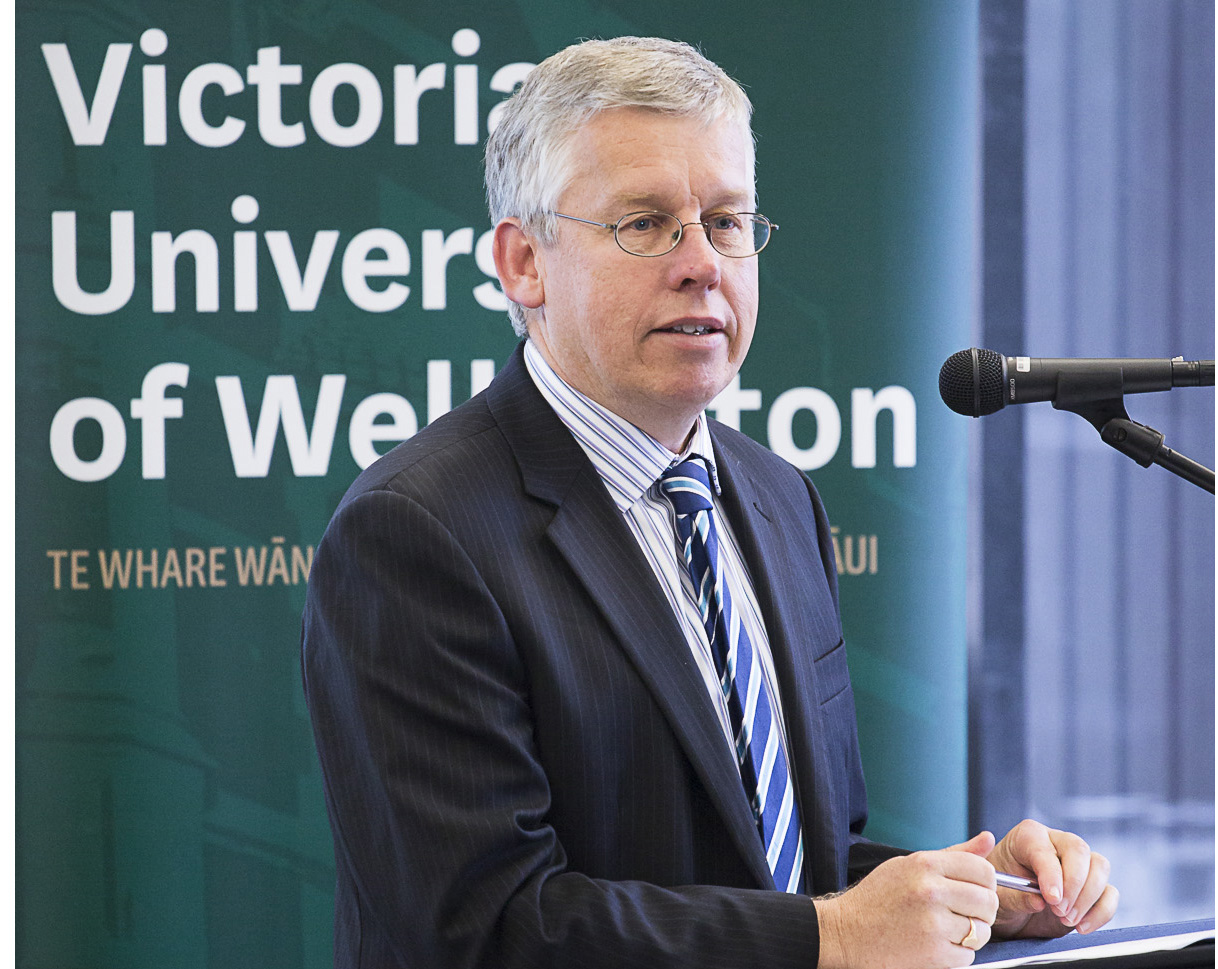
Photo: Mark Beatty
On 19 March 2015, Professor Robert Ayson gave an address at the National Library in Wellington, to discuss why New Zealand commits to conflict . The presentation: Standing Up for Values? Why does NZ Commit to Conflict? was the first in a series entitled ‘Conflict: A Contemporary Conversation’ that examines issues related to conflict. Robert Ayson is Professor of Strategic Studies at Victoria University where he works in association with the Centre for Strategic Studies.
12 March 2015
Dr Alexander Bukh leads discussion on Dokdo/Takeshima dispute
The Centre for Strategic Studies hosted a roundtable on 12 March with Dr Alexander Bukh, Senior Lecturer in International Relations at Victoria University. Dr Bukh discussed the territorial dispute between the Republic of Korea and Japan over rocks in the East Sea (Sea of Japan) known in the ROK as Dokdo and in Japan as Takeshima. He set out the history of the dispute and the subsequent discussion covered the symbolic and strategic significance of the rocks, the impact of the dispute on the broarder Japan-ROK relationship, a comparison of this dispute with that between China and Japan over Diaoyu/Senkaku, and the likelihhood that it will remain an issue between the two countries.
10 March 2015
CSS hosts discussion with Afghanistan Ambassador
On 10 March, the Centre for Strategic Studies hosted a roundtable for H.E. Nasir Andisha, Afghanistan’s Ambassador to New Zealand, resident in Australia. In a wide-ranging address and subsequent discussion, Ambassador Andisha covered a number of issues including the security transition in Afghanistan from ISAF to a much smaller coalition force with a focus on training; economic issues including the impact on Afghanistan’s economy of the departure of ISAF; the 2014 Presidential election; Afghanistan’s relations with India, Pakistan, China, and the United States; participation in regional organisations; the importance of an increase in development aid; the advances made in access to education for female students; the problem of narcotics; and the logistic difficulties of getting Afghanistan’s exports to overseas markets. Ambassador Andisha also expressed appreciation for New Zealand’s continued assistance in the training of the Afghan military.
9 March 2015
Meeting with JP Morgan
On 9 March, Centre staff met a group from JP Morgan Chase Bank to discuss New Zealand and the region’s security and risk issues. The meeting has become an annual event, providing an opportunity to share views regarding New Zealand and the region and to discuss the ways in which both the country and the region are developing.
25-27 February 2015
China and the South Pacific
Centre Director Jim Rolfe attended a conference ‘China and the Pacific: The View from Oceania’ in Samoa 25-27 February. The conference, jointly organised by the National University of Samoa, the Sun Yat-Sen University of China and Victoria University of Wellington’s New Zealand Contemporary China Research Centre focused on security, economic and social aspects of China’s relationship with the South Pacific with special emphasis on the perceptions held by actors from within the region itself. In contrast to much western and East Asian commentary about its regional role, China was seen by most conference participants as part of the solution to many regional problems rather than a part of the problem. The conference was attended by scholars, officials and analysts from across the region as well as from China, Australia and New Zealand. Dr Rolfe presented a paper ‘Regional Security and the Role of External Actors’.
24 February 2015
EU and China as Strategic Partners
On 24 February, the Centre for Strategic Studies hosted a roundtable with four visiting Chinese scholars on the subject of the 'EU and China as strategic partners'. The Chinese panel featured Professor Shi Zhiquin, Dean and Professor of the Department of International Relations at Tsinghua University; Professor Shi Jian, Jean Monnet Chair and Director of the European Studies Centre at Sichuan University; Professor Ding Chun, Jean Monnet Chair and the Director of European Studies at Fudan University; and Professor Song Xinning, Professor of International Relations and Director of the Centre for European Studies at Renmin University. Their presentations and subsequent discussions covered various aspects of EU-China relations, relations with NATO, China’s relations with the United States, Russia and Japan, and cyber-security.
CSS hosts the ASEAN Secretary-General
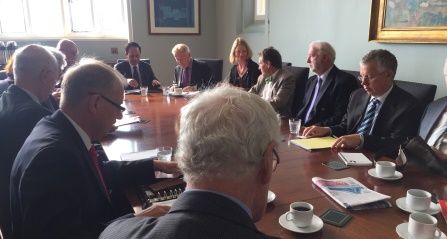
On 24 February, the Centre for Strategic Studies hosted a roundtable discussion with His Excellency Le Luong Minh, Secretary-General of ASEAN. Topics discussed included progress towards finalising the ASEAN community; ASEAN’s centrality in the regional security architecture; the South China Sea and efforts to establish a binding code of conduct; ASEAN’s relations with New Zealand, with China and with the United States; regional trade initiatives; the East Asia Summit; prospects for Timor Leste’s admission to ASEAN; and regional economic growth. The roundtable was attended by Wellington-based scholars and officials from a range of Government agencies.
Secretary-General meets with ASEAN Award students
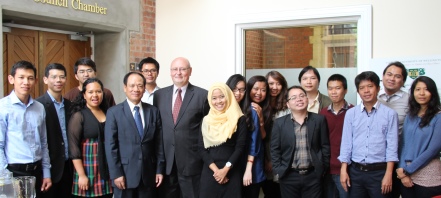
Photo: Sophea Tieng
Following on from the roundtable, the ASEAN Secretary-General informally met with VUW ASEAN Award students at a morning tea event, hosted by Vice-Provost, Professor Roberto Rabel. Amongst the international students attending the event, were groups from Cambodia, Laos, Indonesia, Myanmar and Vietnam.
19 February 2015
CSS hosts Roundtable with Chairman of NATO's Military Committee
On 19 February the Centre for Strategic Studies hosted a roundtable with General Knud Bartels, Chairman of NATO's Military Committee. Topics discussed included the situation in Ukraine and NATO's response in the form of increased exercises and naval and air patrols, the challenge presented by ISIL in Iraq and Syria, the deteriorating situation in parts of northern Africa, progress in Afghanistan and cyber defence. The roundtable was attended by Wellington-based scholars and officials from a range of government agencies.
17 February 2015
Major Power Relations in the Asia-Pacific
On 17 February the Centre held a roundtable led by Senior Fellow, Stuart McMillan, on the relationships between China, Japan and Russia and what these could mean for the China-US relationship. Stuart traversed both the positive and negative factors in the various sets of relationships and concluded that while there is always the possibility that specific situations could lead to problems with the US-China relationship in the worst case leading to conflict, it is more likely that events will be managed so they don’t spiral out of control. Overall however, he argues that there is no overarching vision, strategy or mechanism to ensure regional peace and stability. The subsequent discussion canvassed the full range of the sets of relationships and looked more widely at regional security and the issues that affect it.
11 February 2015
European defence modernisation and its implications for Asia
The Centre for Strategic Studies hosted a roundtable on 11 February 2015 with Dr Simona Soare, a scientific researcher in Romania’s Institute for Political Studies of Defence and Military History. Dr Soare spoke to the topic ‘European defence modernisation and its implications for Asia’. Her address covered the challenges facing the modernisation programme including reductions in defence spending by many European countries, substantial reductions in key military platforms, the absence of power projection capabilities, and a lack of agreement about the nature of the security challenges facing Europe. She discussed the relationship between NATO and the EU’s military structure. Dr Soare outlined the EU’s ambitions for developing a market in Asia for defence equipment manufactured in Europe, while highlighting the challenges that would have to be overcome to for these ambitions to be realised.
